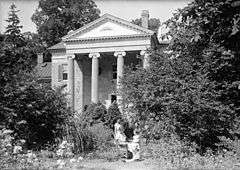Olney (Joppa, Maryland)
|
Olney | |
|
Olney in 1936 | |
  | |
| Location | 1001 Old Joppa Rd., Joppa, Maryland |
|---|---|
| Coordinates | 39°28′39″N 76°22′11″W / 39.47750°N 76.36972°WCoordinates: 39°28′39″N 76°22′11″W / 39.47750°N 76.36972°W |
| Area | 264 acres (107 ha) |
| Built | 1720 |
| Architectural style | Federal |
| NRHP Reference # | 87001197[1] |
| Added to NRHP | July 9, 1987 |
Olney, originally patented as Prospect, is a historic home and farm complex located at Joppa, Harford County, Maryland. It is a 264-acre (1.07 km2) working pony farm with a collection of 15 structures ranging in style, use, and elegance. The main building on the property is a 2 1⁄2-story brick house dating to 1810, generally called "the mansion." The house was evolved into a museum of Maryland architecture, with salvaged features from demolished buildings in Baltimore and Philadelphia. These include paneling from the Isaac Van Bibber house in Fells Point, Baltimore dating to 1815; the marble Ionic portico from William Small's Baltimore Athenaeum from 1830; and a marble bas-relief plaque designed by Pierre L'Enfant for Robert Morris's great 1795 house in Philadelphia. Also on the property is an early-18th-century, 2 1⁄2-story stone dwelling and a variety of still-functioning farm structures that in themselves range in style from simple stone stables and frame hay barns to an unusual two-story brick blacksmith's shop. In addition, the 1914 Union Chapel School, was moved onto the property in 1980 and re-outfitted as St. Alban's Anglican Church. The property was developed by J. Alexis Shriver (1872–1951), a man prominent in local and state historical and agricultural matters who lived at Olney from 1890 until his death.[2]
It was listed on the National Register of Historic Places in 1987.[1]
References
- 1 2 National Park Service (2010-07-09). "National Register Information System". National Register of Historic Places. National Park Service.
- ↑ Christopher Weeks (December 1986). "National Register of Historic Places Registration: Olney Farm" (PDF). Maryland Historical Trust. Retrieved 2016-01-01.
External links
- Olney Farm, Harford County, including photo from 1977, Maryland Historical Trust website
- Olney Farm website
- St. Alban's Anglican Church website
- Olney, Hollingsworth Road, Jerusalem vicinity, Harford, MD at the Historic American Buildings Survey (HABS)


